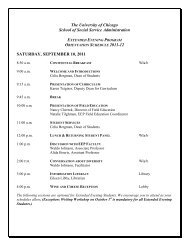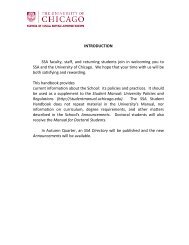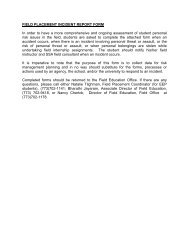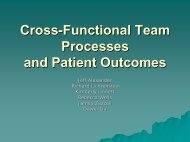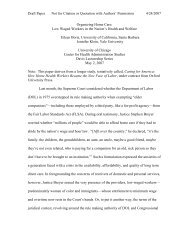2004 - School of Social Service Administration - University of Chicago
2004 - School of Social Service Administration - University of Chicago
2004 - School of Social Service Administration - University of Chicago
You also want an ePaper? Increase the reach of your titles
YUMPU automatically turns print PDFs into web optimized ePapers that Google loves.
DISSERTATION ABSTRACT<br />
ated the SES-outcome relationship. The process study results show that higher<br />
levels <strong>of</strong> therapists’ approach <strong>of</strong> financial, work, and unemployment topics are<br />
associated with greater improvement across socioeconomic status groups.<br />
The most important implication <strong>of</strong> the current findings for clinical practice<br />
is that clinicians must be aware that there may be limitations in the use <strong>of</strong><br />
these empirically validated treatments with lower SES depressed patients, as<br />
their improvement rates are likely to be less than those <strong>of</strong> middle SES<br />
depressed patients treated by the same modalities. <strong>Social</strong> workers using these<br />
modalities with lower SES patients should consider modifying them to<br />
include elements discussed in several theoretical, clinical, and empirical<br />
sources.<br />
A second finding highlights the importance <strong>of</strong> addressing economic stress<br />
in the treatment process. The findings suggest that clinicians should inquire<br />
about and encourage discussion <strong>of</strong> economic stressors in the early sessions <strong>of</strong><br />
treatment for both lower and middle SES patients.<br />
Finally, this study documents the role played by therapist attitudes in<br />
influencing differential improvement by SES in therapy for depression. It is<br />
important for therapists to be aware <strong>of</strong> their own stereotypes about motivation<br />
and prognosis for lower SES patients. It also suggests that clinician training<br />
include education about the difficult life circumstances faced by lower SES<br />
patients. ■<br />
ABOUT THE AUTHOR<br />
LYDIA FALCONNIER graduated from the Ph.D. program at the <strong>School</strong> <strong>of</strong> <strong>Social</strong> <strong>Service</strong><br />
<strong>Administration</strong> in December 2003. Her dissertation research evaluated the relationship between<br />
socioeconomic status and both the processes and outcomes <strong>of</strong> treatment for depression. In August<br />
2002, she accepted a position at the <strong>University</strong> <strong>of</strong> Illinois at <strong>Chicago</strong>, where she is currently an<br />
assistant pr<strong>of</strong>essor at the Jane Addams College <strong>of</strong> <strong>Social</strong> Work. Her research interest in poverty<br />
and mental health continues, with a current focus on interventions for mentally ill parents whose<br />
children are in the custody <strong>of</strong> the Illinois Department <strong>of</strong> Children and Family <strong>Service</strong>s.<br />
77






